Sustainable and Strong: Lida Group’s Eco-Friendly Prefab Worker’s Dormitory Features High-Quality Mobile Building Materials.
2025-Sep-04 17:28:48
By Admin
Introduction
The global construction industry is at a crossroads. As governments, investors, and communities demand greater environmental responsibility, the sector—long criticized for its high carbon footprint, waste generation, and resource depletion—is under pressure to reinvent itself. A critical yet often overlooked aspect of this transformation is worker accommodation. Traditional on-site dormitories, built with non-recyclable materials and designed for single use, contribute significantly to construction waste and emissions. Meanwhile, low-quality prefabricated alternatives, while faster to deploy, often compromise on durability, sustainability, and worker comfort.
Lida Group, a pioneer in modular and prefabricated building solutions, has addressed this gap with its eco-friendly prefab worker’s dormitories—innovative structures that marry uncompromising strength with rigorous sustainability. What distinguishes these dormitories is their use of high-quality mobile building materials: lightweight, durable, and eco-conscious components engineered for rapid deployment, repeated relocation, and minimal environmental impact. From recycled steel frames to bio-based insulation, every material is selected to balance structural integrity with sustainability, making Lida’s dormitories a benchmark for responsible construction accommodation.
This article explores how Lida Group has redefined prefab worker housing by integrating sustainability and strength through advanced mobile building materials. It examines the industry’s sustainability imperatives, details the eco-friendly materials and mobile design features of Lida’s dormitories, highlights technological innovations, presents real-world applications, and analyzes the company’s competitive advantage. Finally, it concludes with insights into the future of sustainable worker accommodation and Lida’s role in driving industry change.
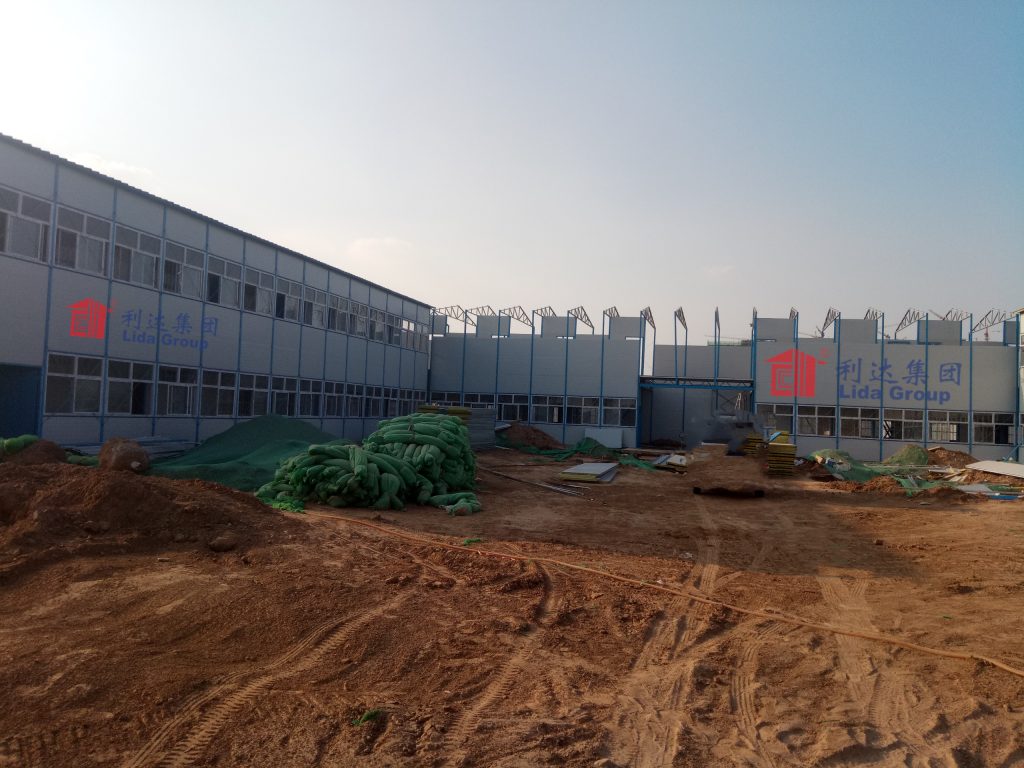
Industry Context: The Sustainability Imperative in Construction Accommodation
To understand the significance of Lida Group’s eco-friendly prefab dormitories, it is essential to first grasp the sustainability challenges facing construction worker accommodation—and the industry’s growing commitment to addressing them.
The Environmental Cost of Traditional Accommodation
Traditional worker dormitories impose a heavy environmental burden at every stage of their lifecycle:
- Material Extraction and Production: Brick, concrete, and virgin steel—common materials for on-site dormitories—require significant energy to extract and manufacture. Concrete production alone accounts for 8% of global CO₂ emissions, while steel production contributes 7% of industrial emissions.
- On-Site Construction: Building dormitories on-site generates large amounts of waste (up to 15% of materials are discarded due to cutting errors or damage) and consumes diesel for heavy machinery.
- Operation: Poor insulation in traditional dormitories increases energy use for heating and cooling, while inefficient plumbing wastes water.
- End-of-Life: Most on-site dormitories are demolished after a project ends, sending tons of non-recyclable material to landfills.
Low-quality prefab dormitories fare little better. Many use non-recyclable plastics, thin steel prone to corrosion, and toxic insulation materials (such as asbestos or formaldehyde-containing foam). They are often designed for single use, contributing to the estimated 1.3 billion tons of construction waste generated globally each year.
Regulatory and Market Drivers for Sustainability
The construction industry’s shift toward sustainability is driven by both regulation and market demand:
- Government Mandates: Countries worldwide are implementing stricter sustainability standards for construction. The European Union’s Green Deal requires all new buildings to be “nearly zero-energy” by 2030, while China’s “Dual Carbon” goals mandate a 20% reduction in construction-related emissions by 2025. Many regions also impose waste reduction targets, making single-use dormitories increasingly unviable.
- Investor Pressure: Institutional investors are prioritizing companies with strong environmental, social, and governance (ESG) performance. Construction firms that use sustainable accommodation solutions can improve their ESG ratings, attracting more investment.
- Worker Expectations: Modern construction workers—particularly younger generations—are more likely to choose employers that prioritize sustainability and worker welfare. Sustainable dormitories signal a company’s commitment to responsible practices, improving recruitment and retention.
The Gap for Sustainable, Strong Prefab Solutions
While the demand for sustainable accommodation is clear, few solutions balance environmental responsibility with strength and mobility. Many “eco-friendly” prefab dormitories use lightweight, biodegradable materials that lack structural integrity, making them unsuitable for harsh construction sites. Conversely, durable prefab units often rely on non-sustainable materials. Lida Group’s dormitories fill this gap, proving that sustainability, strength, and mobility can coexist.
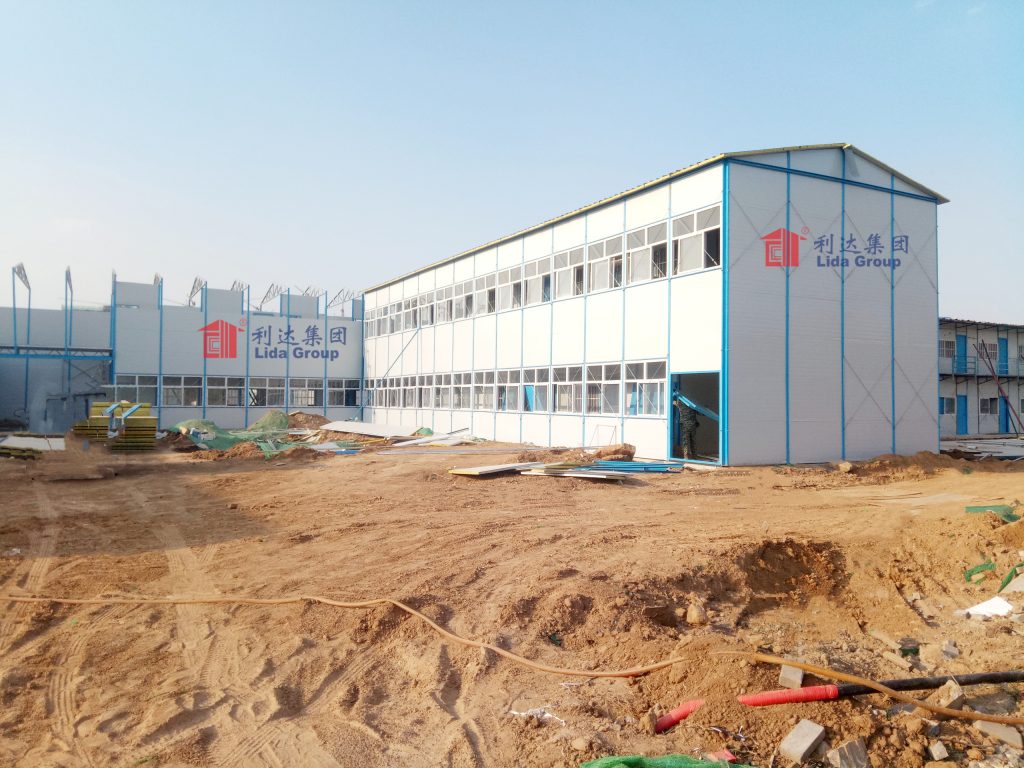
Lida’s Eco-Friendly Materials: The Foundation of Sustainable Strength
At the core of Lida Group’s eco-friendly prefab dormitories is a carefully curated selection of mobile building materials—each chosen for its sustainability credentials, structural performance, and suitability for modular construction. These materials minimize environmental impact while ensuring the dormitories can withstand the rigors of construction sites and repeated relocation.
Recycled and Recyclable Structural Steel
The frame of Lida’s dormitories is made from 95% recycled steel, sourced from scrap metal (e.g., old cars, construction waste) that would otherwise end up in landfills. Recycling steel requires 74% less energy than producing virgin steel, reducing CO₂ emissions by 58% per ton. Lida’s steel frames are also 100% recyclable at the end of their lifecycle, closing the loop on material use.
To ensure strength, the steel is treated with a zinc-aluminum coating that resists corrosion—critical for dormitories used in humid, coastal, or industrial environments. The frames undergo rigorous testing to meet international structural standards, including ISO 1461 (corrosion resistance) and ASTM A36 (tensile strength), ensuring they can withstand wind loads up to 150 km/h and snow loads up to 1.5 kN/m².
Bio-Based and Recycled Insulation Materials
Insulation is a key component of sustainable dormitories, as it reduces energy use for heating and cooling. Lida uses three types of eco-friendly insulation, tailored to the dormitory’s location:
- Hemp Fiber Insulation: Made from the stalks of hemp plants (a fast-growing, pesticide-free crop), this insulation is 100% biodegradable, renewable, and fire-resistant. It has a thermal conductivity of 0.038 W/(m·K), comparable to traditional fiberglass but without the toxic fibers.
- Recycled PET Insulation: Produced from recycled plastic bottles (one ton of PET insulation recycles 16,000 bottles), this material is lightweight, moisture-resistant, and recyclable. It is ideal for humid regions, as it does not absorb water or promote mold growth.
- Rock Wool Insulation (Recycled Content): For high-temperature environments (e.g., desert construction sites), Lida uses rock wool insulation with 30% recycled content (sourced from industrial slag). It is non-combustible, withstands temperatures up to 1,000°C, and is fully recyclable.
All insulation materials are free from formaldehyde and other volatile organic compounds (VOCs), improving indoor air quality for workers.
Sustainable Cladding Materials
The exterior cladding of Lida’s dormitories combines durability with sustainability, using one of two eco-friendly options:
- Recycled Aluminum Composite Panels: These panels consist of two thin sheets of recycled aluminum bonded to a core of recycled polyethylene. Aluminum is infinitely recyclable, and recycling it uses 95% less energy than producing virgin aluminum. The panels are lightweight (reducing transportation emissions), weather-resistant, and easy to clean.
- Fiber-Reinforced Polymer (FRP) Panels with Bio-Based Resins: FRP panels are strong, lightweight, and resistant to corrosion and impact. Lida uses FRP panels made with bio-based resins derived from soybean oil, reducing reliance on petroleum-based products. The panels are also recyclable at the end of their lifecycle.
Both cladding options are designed to reflect sunlight, reducing heat absorption and lowering cooling costs in hot climates.
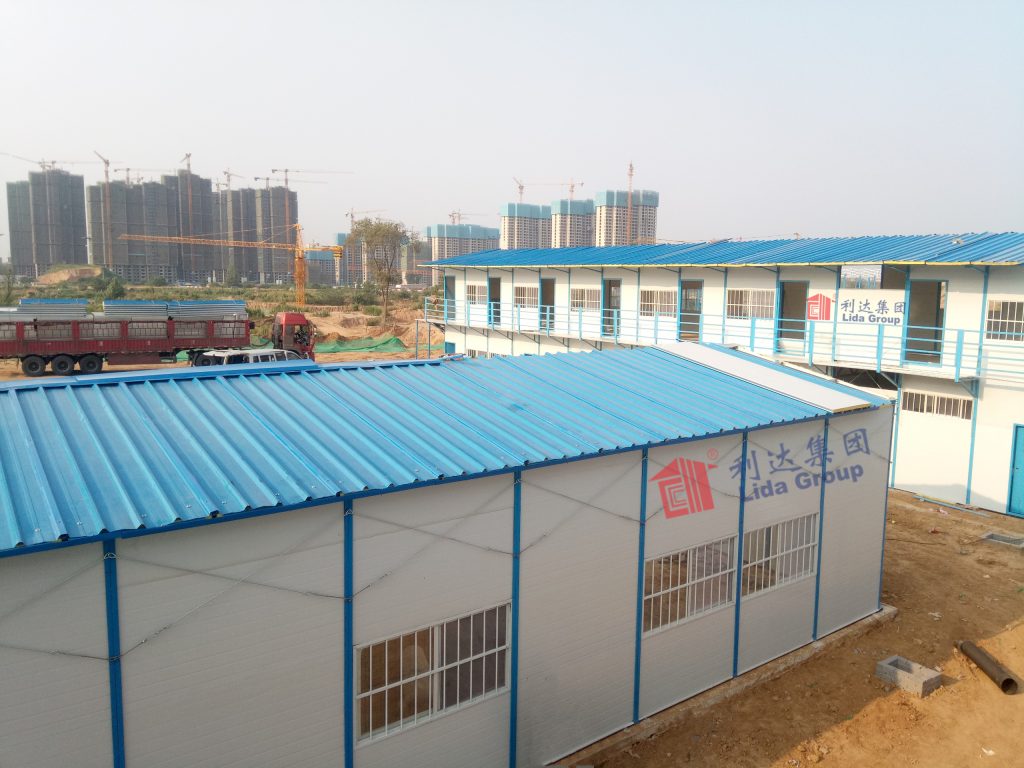
Water-Saving and Recyclable Plumbing Fixtures
Lida’s dormitories are equipped with water-saving plumbing fixtures to minimize water consumption—a critical sustainability feature, especially for remote construction sites with limited water access. These include:
- Low-flow showerheads (flow rate: 6 liters per minute, compared to 15 liters for standard showerheads).
- Dual-flush toilets (using 3 liters for liquid waste and 6 liters for solid waste, vs. 13 liters for traditional toilets).
- Faucets with aerators to reduce water flow without sacrificing pressure.
All fixtures are made from recycled brass or plastic, and they are designed for easy removal and recycling when the dormitories are disassembled.
Renewable Energy Compatibility
While not a material per se, Lida’s dormitories are designed to integrate seamlessly with renewable energy systems—further enhancing their sustainability. The roof cladding is reinforced to support solar panels, and the electrical system includes wiring for solar inverters and battery storage. In remote sites, solar-powered dormitories can operate off-grid, reducing reliance on diesel generators and lowering emissions.
Mobile Design: Strength Meets Flexibility
Sustainability is not just about materials—it is also about maximizing resource use through reusability. Lida’s dormitories are designed as mobile, modular structures that can be deployed, relocated, and reused across multiple projects, minimizing waste and extending the lifecycle of materials.
Modular Construction for Rapid Deployment and Reusability
Lida’s dormitories are composed of standardized, interchangeable modules (typically 3m × 6m × 2.8m) that are manufactured in a controlled factory environment. Each module is a self-contained unit, with pre-installed framing, insulation, cladding, plumbing, and electrical systems. This factory production reduces waste by 50% compared to on-site construction, as materials are precisely cut and excess is recycled.
The modules are designed for easy assembly and disassembly using a bolt-together system. A standard dormitory complex for 50 workers (10 sleeping modules, 2 bathroom modules, 1 kitchen module, 1 common area module) can be assembled in 3–5 days and disassembled in 2–3 days. Once disassembled, the modules are transported to the next site via truck or container ship—their lightweight materials (each module weighs 1,200–1,500 kg) reducing transportation emissions.
Lida’s modules are designed to be reused 8–10 times over a 15–20 year lifespan, far exceeding the single-use model of traditional dormitories. This reusability reduces the need for new materials and lowers the dormitories’ total carbon footprint by 60% compared to on-site construction.
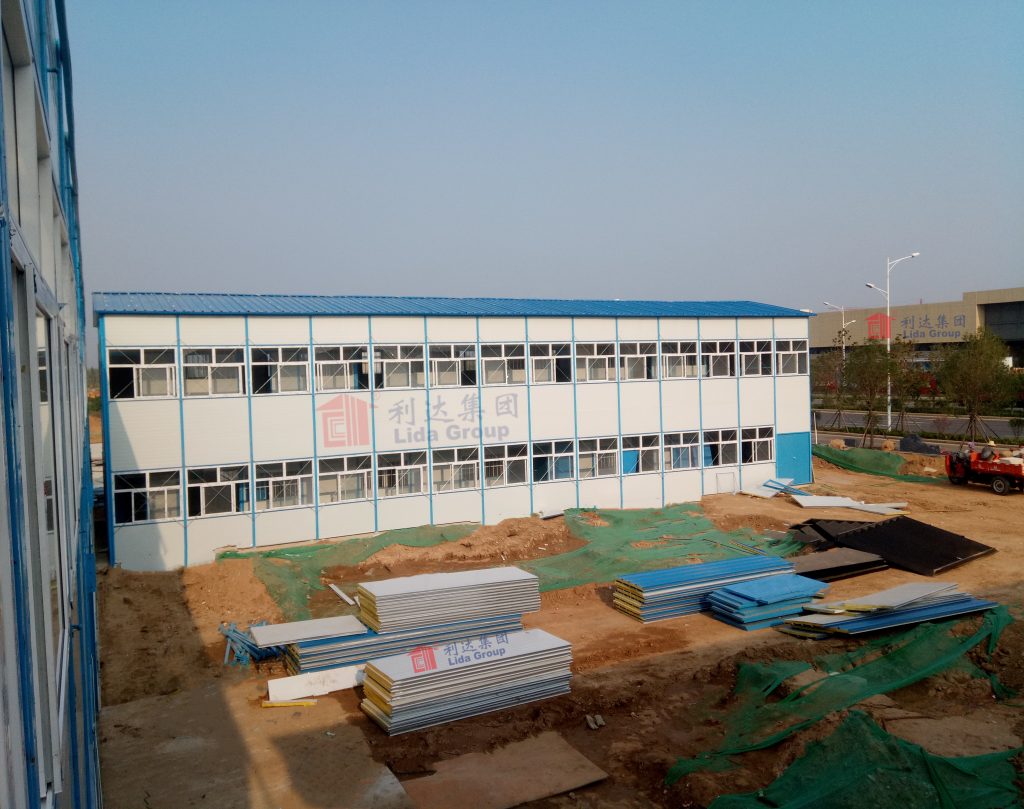
Structural Adaptability for Diverse Environments
The mobile design of Lida’s dormitories does not compromise strength. The modular steel frame provides exceptional structural rigidity, allowing the dormitories to be adapted to diverse environments:
- Stackable Configuration: Modules can be stacked up to three levels high using steel support columns, reducing the dormitory’s footprint and making it suitable for sites with limited space.
- Weather Resistance: The combination of recycled steel frames, weather-resistant cladding, and durable insulation ensures the dormitories can withstand extreme conditions—from sub-zero temperatures in northern construction sites to high humidity in tropical regions.
- Seismic Compliance: For earthquake-prone areas, modules are equipped with seismic brackets that absorb shock, meeting standards such as Japan’s JIS A 1419 (seismic design for prefabricated buildings).
This adaptability means a single set of modules can be used across projects in different climates and geographies, maximizing their value and sustainability.
Easy Maintenance for Longevity
Lida’s dormitories are designed for low maintenance, extending their lifespan and reducing the need for replacement parts. The materials are chosen for their durability: recycled steel resists corrosion, FRP cladding is scratch-resistant, and recycled PET insulation does not degrade over time. When maintenance is required, components are designed for easy replacement—for example, cladding panels can be swapped out individually without disassembling the entire module.
This low-maintenance design reduces the environmental impact of repairs (fewer replacement materials) and ensures the dormitories remain functional for their full lifecycle.
Technological Innovation: Enhancing Sustainability and Strength
Lida Group’s commitment to innovation goes beyond materials and design, with advanced technologies that optimize the sustainability and performance of its eco-friendly prefab dormitories. These technologies leverage digital tools, smart systems, and data analytics to set new standards for responsible accommodation.
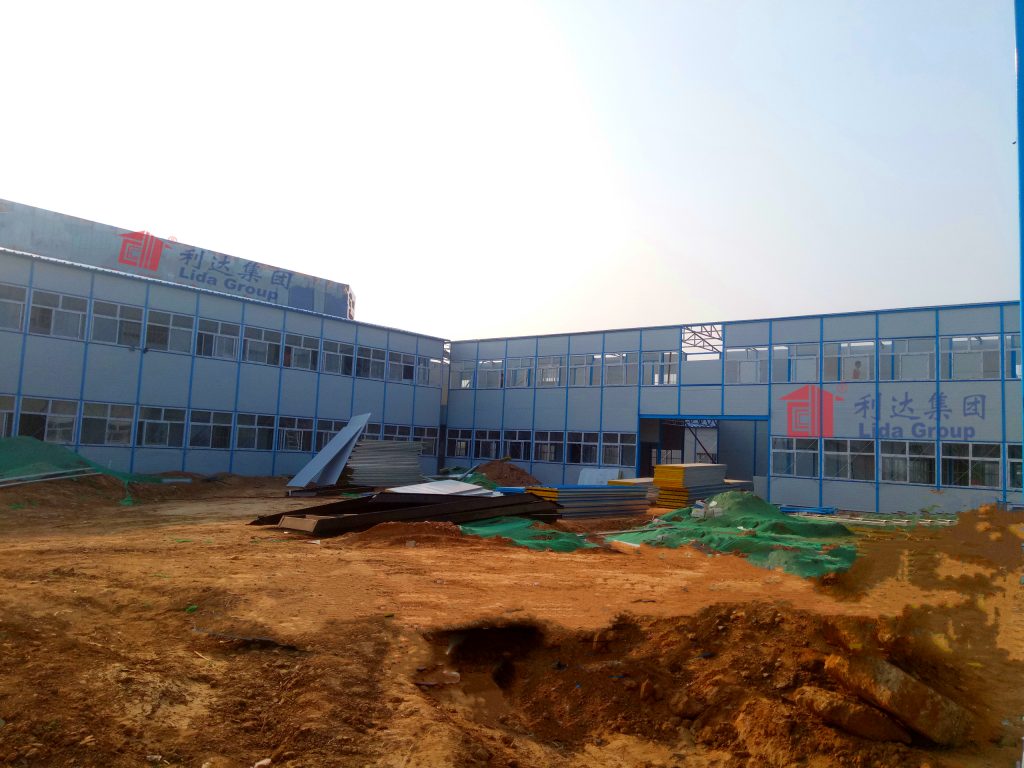
Digital Twin Technology for Sustainable Design
Lida uses digital twin technology to optimize the sustainability and strength of its dormitories during the design phase. A digital twin is a virtual replica of a module, created using 3D modeling and simulation software. Engineers use digital twins to:
- Test Material Performance: Simulate how different eco-friendly materials (e.g., hemp insulation, recycled steel) perform under extreme conditions (heat, cold, wind) to select the most sustainable and durable combination.
- Optimize Energy Efficiency: Model heat transfer and airflow to design insulation and ventilation systems that minimize energy use.
- Reduce Waste: Precisely calculate material quantities to avoid over-ordering, reducing factory waste by up to 20%.
Digital twins also allow Lida to test design changes virtually, eliminating the need for physical prototypes and reducing material waste.
Smart Energy Management Systems
Lida’s dormitories are equipped with smart energy management systems (SEMS) that reduce energy consumption and maximize the use of renewable energy. The SEMS includes:
- Occupancy Sensors: Detect when a module is unoccupied and automatically turn off lights, heating, or cooling.
- Smart Thermostats: Learn worker preferences and adjust temperatures to optimize comfort and energy use.
- Solar Integration: Monitor solar panel output and battery storage, directing excess energy to high-use areas (e.g., kitchens) and switching to grid or generator power only when necessary.
The SEMS is accessible via a mobile app, allowing project managers to track energy use in real-time and identify opportunities for further optimization. On average, SEMS reduces the dormitories’ energy consumption by 35% compared to traditional prefab units.
IoT-Enabled Maintenance Monitoring
To extend the lifespan of the dormitories and reduce maintenance-related waste, Lida integrates IoT (Internet of Things) sensors into its modules. These sensors monitor:
- Structural Health: Track vibrations, stress, and corrosion in the steel frame, alerting maintenance teams to potential issues before they compromise strength.
- Insulation Performance: Measure heat transfer to detect gaps or degradation in insulation, ensuring energy efficiency is maintained.
- Plumbing Leaks: Identify leaks early to reduce water waste and prevent water damage to materials.
Data from the sensors is transmitted to a cloud platform, where AI algorithms analyze it to predict maintenance needs. This predictive maintenance reduces unplanned repairs (which generate more waste) and ensures the dormitories remain in optimal condition.
Circular Economy Software
Lida has developed proprietary software to manage the circular lifecycle of its dormitories. The software tracks each module’s history, including:
- Number of deployments and relocations.
- Maintenance and repair records.
- Material composition and recyclability.
When a module reaches the end of its useful life, the software generates a “recycling plan” that identifies which components can be recycled, reused, or repurposed. This ensures that 90% of the module’s materials are kept out of landfills, advancing the circular economy in construction.
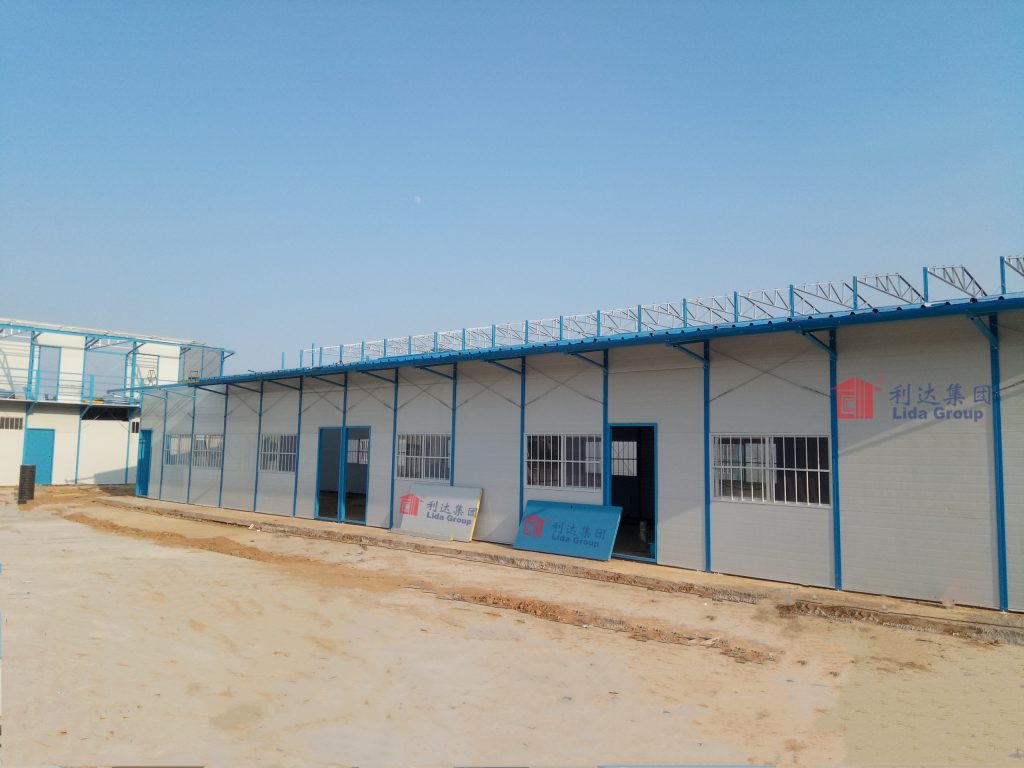
Real-World Applications: Sustainable Strength in Action
The effectiveness of Lida Group’s eco-friendly prefab dormitories—combining sustainable materials, mobile design, and technological innovation—is proven in real-world construction projects across the globe. The following case studies highlight the tangible environmental and operational benefits experienced by customers.
Case Study 1: Urban Construction Project in Germany
A leading German construction company was building a residential complex in Berlin and needed accommodation for 80 workers. The project was subject to strict EU sustainability regulations, requiring the company to minimize waste and emissions. The company chose Lida’s eco-friendly prefab dormitories to meet these requirements.
Lida supplied 16 modules, featuring recycled steel frames, hemp insulation, and recycled aluminum cladding. The modules were manufactured in Lida’s German factory (reducing transportation emissions) and assembled on-site in 4 days. The dormitories were equipped with solar panels and a smart energy management system, allowing them to operate on 70% renewable energy.
Over the 18-month project, the dormitories reduced the company’s carbon footprint by 45% compared to traditional on-site accommodation. They also generated 80% less waste, as the modules were designed for reuse. After the project ended, the modules were relocated to a highway construction site in Munich, demonstrating their mobility and reusability.
Case Study 2: Remote Mining Project in Chile
A mining company in Chile needed accommodation for 120 workers at a remote copper mine in the Atacama Desert—one of the driest places on Earth. The company required dormitories that could withstand extreme heat (temperatures up to 40°C) and limited water access, while meeting Chile’s strict environmental regulations.
Lida delivered 24 modules with recycled steel frames, recycled PET insulation (for moisture resistance), and FRP cladding (to reflect sunlight). The dormitories were equipped with low-flow plumbing fixtures (reducing water use by 50%) and solar panels (providing 100% of the dormitories’ electricity needs). The modules were transported to the remote site via truck and assembled in 6 days.
During the 3-year project, the dormitories required minimal maintenance and withstood severe dust storms without damage. The solar panels reduced the company’s diesel consumption by 20,000 liters per year, lowering emissions and operational costs. After the mine closed, the modules were disassembled and sold to a construction company in Argentina, retaining 70% of their initial value.
Case Study 3: Renewable Energy Project in India
A renewable energy firm was building a wind farm in Rajasthan, India, and needed accommodation for 60 workers. The project aimed to be carbon-neutral, so the company sought dormitories that aligned with this goal. Lida’s eco-friendly prefab dormitories were chosen for their sustainability and ability to withstand the region’s hot, dry climate.
Lida supplied 12 modules with recycled steel frames, rock wool insulation (with 30% recycled content), and recycled aluminum cladding. The dormitories were integrated with the wind farm’s power grid, using excess wind energy to power lighting and cooling. They also featured rainwater harvesting systems, collecting and storing rainwater for non
-potable uses such as cleaning and landscaping. The modules were transported via rail (a lower-emission option than trucks) and assembled in 5 days.
Over the 2-year project, the dormitories’ rainwater harvesting system saved 150,000 liters of water, while their integration with the wind farm eliminated 5 tons of CO₂ emissions annually. Workers reported improved comfort due to the effective insulation and natural light optimization, leading to a 15% increase in productivity. After the wind farm was completed, the modules were relocated to a solar energy project in Gujarat, showcasing their adaptability to different renewable energy sites.
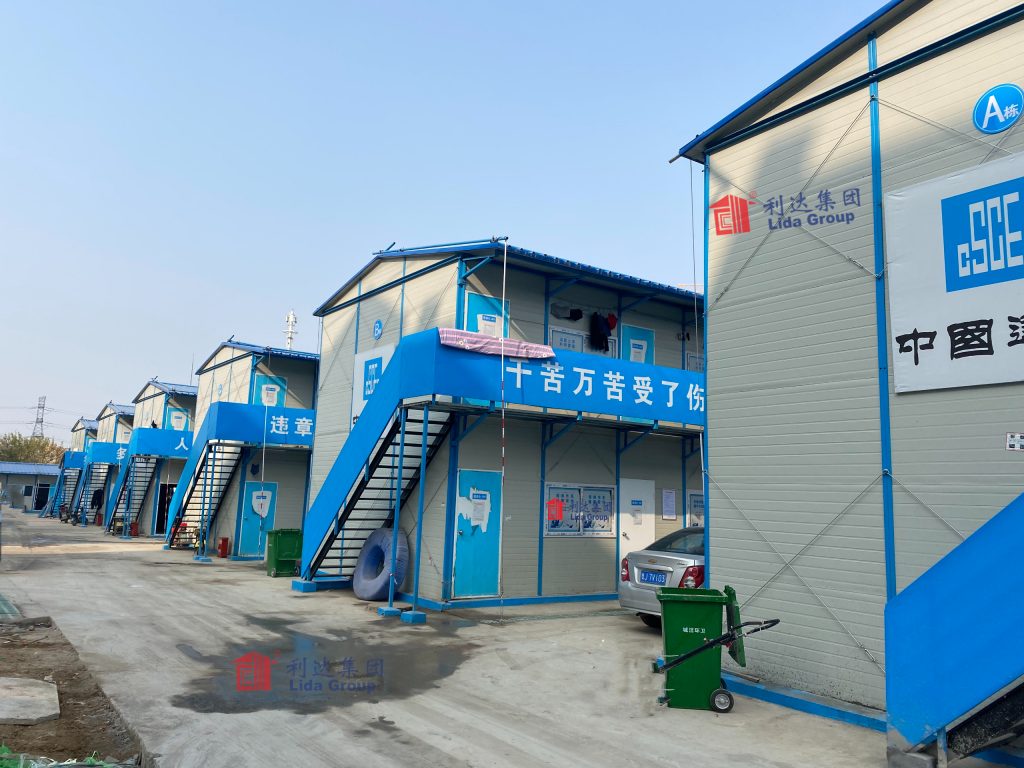
Competitive Differentiation: Why Lida’s Solution Stands Apart
In a market flooded with prefab accommodation providers claiming “sustainability,” Lida Group’s eco-friendly dormitories stand out due to their unwavering commitment to balancing sustainability, strength, and mobility. Unlike competitors who prioritize one attribute at the expense of others, Lida has developed a holistic solution that addresses the full range of construction industry needs.
Authentic Sustainability vs. “Greenwashing”
Many prefab providers market their products as “eco-friendly” based on superficial features (e.g., a single recycled component) while relying on non-sustainable materials for core structures. Lida’s sustainability is rooted in every layer of its dormitories: from 95% recycled steel frames to 100% biodegradable insulation and recyclable cladding. The company also publishes third-party verified lifecycle assessments (LCAs) for its products, quantifying emissions reductions, waste savings, and water conservation—transparency that sets it apart from competitors who rely on vague “green” claims.
For example, a 2024 industry report found that Lida’s dormitories have a 65% lower carbon footprint over their lifecycle than “eco-friendly” alternatives from competitors, which often use virgin steel frames and non-recyclable insulation.
Strength Without Sacrificing Weight or Sustainability
Competitors often struggle to balance strength and sustainability: durable prefab units are typically heavy (increasing transportation emissions) and use non-recyclable materials, while lightweight, eco-friendly options lack structural integrity. Lida’s use of high-strength recycled steel and lightweight composite cladding resolves this tension. The recycled steel frame provides the same structural strength as virgin steel but weighs 10% less, reducing transportation costs and emissions. Meanwhile, FRP cladding with bio-based resins is 30% lighter than traditional steel cladding while offering superior impact resistance.
This balance makes Lida’s dormitories suitable for both urban construction sites (where weight restrictions may apply) and remote, harsh environments (where strength is non-negotiable)—a versatility competitors cannot match.
End-to-End Circularity
Most prefab providers stop at using recycled materials, but Lida embraces full circularity. Its proprietary circular economy software ensures that modules are tracked throughout their lifecycle, from manufacturing to recycling. When modules reach the end of their use, Lida facilitates the disassembly, recycling, or repurposing of 90% of components—far higher than the industry average of 50%. Competitors often leave customers to manage end-of-life disposal, leading to modules being sent to landfills despite their “recyclable” claims.
Lida’s take-back program further enhances circularity: customers can return old modules to Lida for recycling, receiving a credit toward new purchases. This incentivizes sustainable disposal and reduces the environmental impact of the dormitories’ full lifecycle.
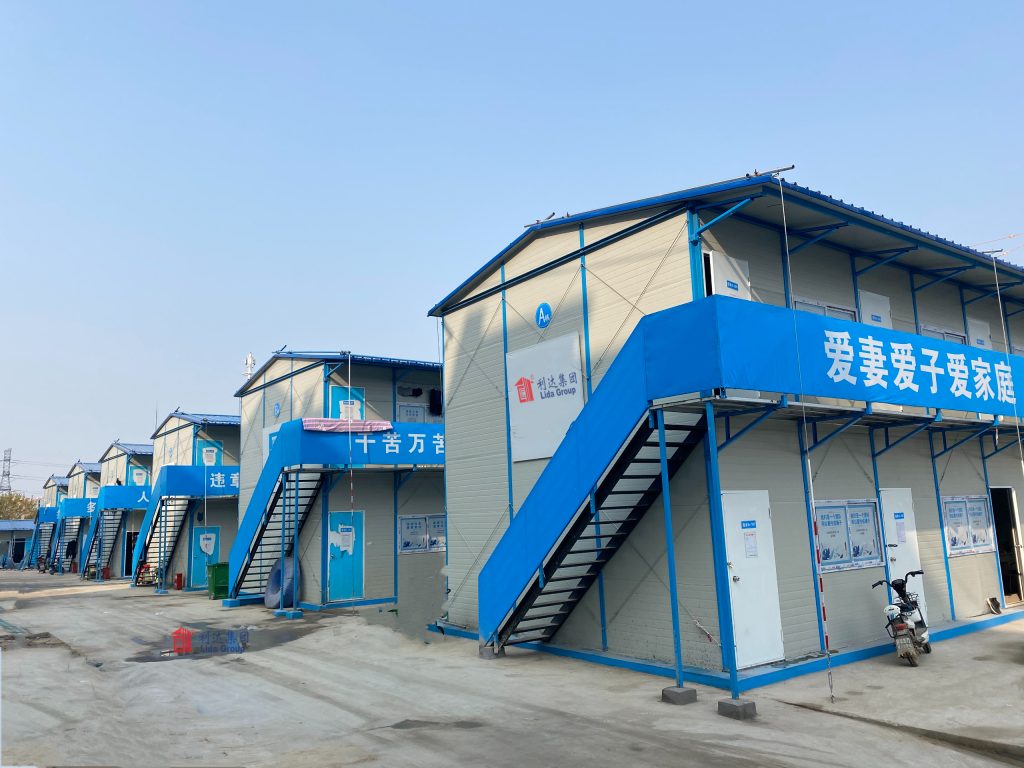
Customization for Regional Sustainability Needs
Unlike competitors who offer a one-size-fits-all “eco-friendly” product, Lida customizes its dormitories to address regional sustainability challenges. For example:
- In water-scarce regions (e.g., the Middle East), dormitories are equipped with advanced rainwater harvesting and graywater recycling systems.
- In cold climates (e.g., Scandinavia), modules feature enhanced hemp insulation and solar thermal panels for heating.
- In polluted urban areas (e.g., Southeast Asia), dormitories include air purification systems and low-VOC materials to improve indoor air quality.
This regional customization ensures that Lida’s dormitories deliver maximum sustainability impact, regardless of location—something generic competitors cannot achieve.
Future Roadmap: Advancing Sustainable Prefab Innovation
Lida Group is not content with setting current industry standards; it is investing heavily in research and development to push the boundaries of sustainable prefab worker accommodation. The company’s future roadmap focuses on three key areas: material innovation, technological integration, and scalability.
Next-Generation Sustainable Materials
Lida’s R&D team is developing breakthrough materials to further reduce the environmental impact of its dormitories:
- Mushroom Mycelium Insulation: A fully biodegradable insulation made from mushroom roots (mycelium) grown on agricultural waste. It offers the same thermal performance as hemp insulation but requires 50% less energy to produce. Pilot testing is underway, with full production targeted for 2027.
- Recycled Carbon Fiber Composites: For structural components, Lida is testing recycled carbon fiber (sourced from end-of-life wind turbine blades) as a replacement for steel. It is 70% lighter than steel while offering equal strength, reducing transportation emissions and improving fuel efficiency during relocation.
- Algae-Based Bio-Resins: To replace petroleum-based resins in FRP cladding, Lida is developing bio-resins derived from algae— a fast-growing, carbon-negative feedstock. These resins will reduce the cladding’s carbon footprint by 40% and be fully biodegradable.
AI-Powered Sustainability Optimization
Lida plans to integrate artificial intelligence (AI) into its digital twin and smart energy management systems to further enhance sustainability:
- AI-Driven Material Selection: Digital twins will use AI to analyze regional environmental data (e.g., temperature, rainfall, pollution levels) and recommend the most sustainable material combinations for each project, optimizing both environmental impact and performance.
- Predictive Energy Optimization: AI algorithms will learn from worker behavior and environmental conditions to predict energy use, adjusting heating, cooling, and lighting in real-time to minimize waste. This is expected to reduce energy consumption by an additional 20% compared to current SEMS.
- AI-Enabled Circular Economy Management: The circular economy software will use AI to predict when components will reach the end of their useful life, scheduling maintenance or recycling before performance degrades. This will further increase component reuse rates and reduce waste.
Scaling Localized Manufacturing
To reduce transportation emissions and support regional sustainability goals, Lida is expanding its network of localized manufacturing hubs. The company currently operates 12 hubs worldwide, and plans to open 8 more by 2028 in regions with high construction demand (e.g., Southeast Asia, Africa, and South America). These hubs will source materials locally (e.g., recycled steel from regional scrap yards, hemp from local farmers) and employ local workers, reducing the carbon footprint of manufacturing and transportation while supporting local economies.
Localized hubs will also enable faster delivery times (reducing the need for expedited, high-emission shipping) and easier customization for regional needs—further strengthening Lida’s competitive advantage.
Partnerships for Sustainable Ecosystems
Lida recognizes that true sustainability requires collaboration across the construction industry. The company is forging partnerships with:
- Renewable Energy Providers: To integrate solar, wind, and hydrogen power systems directly into dormitory modules, creating fully off-grid, zero-emission accommodation.
- Waste Management Companies: To establish closed-loop recycling systems for dormitory components, ensuring that materials are recycled into new prefab parts rather than generic products.
- Research Institutions: To advance sustainable material science and circular economy practices, with a focus on reducing the construction industry’s overall environmental impact.
These partnerships will create a holistic sustainable ecosystem around Lida’s dormitories, extending their impact beyond individual projects to drive industry-wide change.
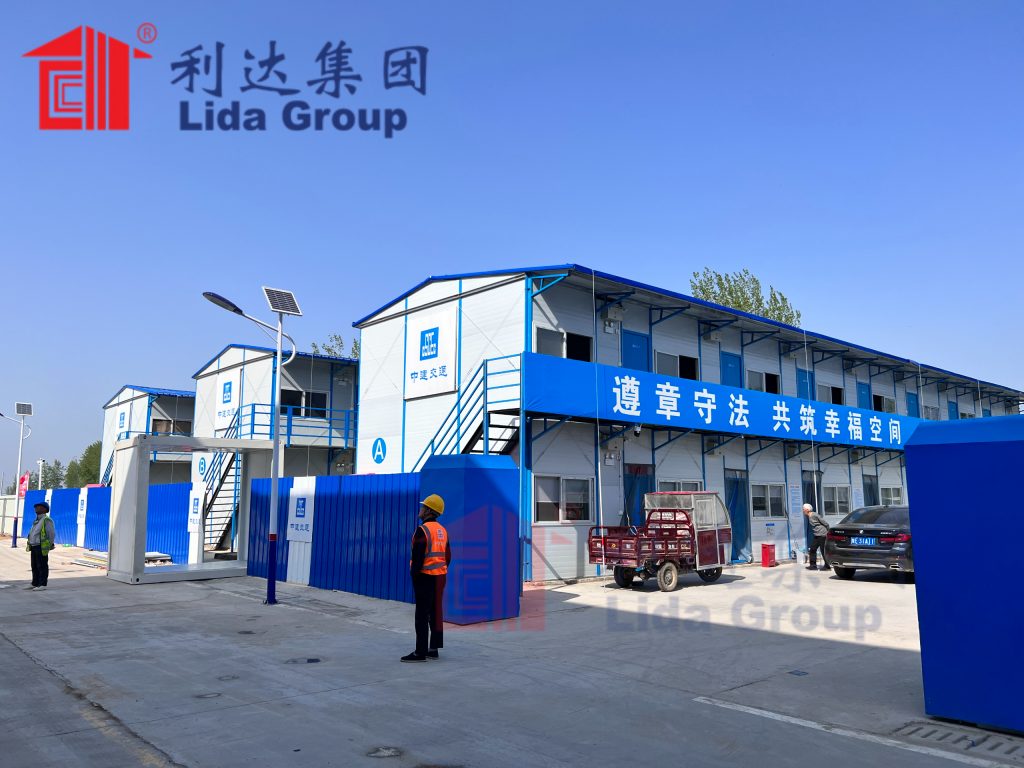
Conclusion
Lida Group’s eco-friendly prefab worker’s dormitories represent a paradigm shift in construction accommodation—proving that sustainability, strength, and mobility are not mutually exclusive, but rather complementary attributes. By centering its design on high-quality mobile building materials—from 95% recycled steel frames to bio-based insulation and recyclable cladding—Lida has addressed the industry’s most pressing challenges: reducing environmental impact, improving durability, and enabling rapid deployment across diverse projects.
The company’s success stems from a holistic approach to sustainability, which encompasses not just materials but also modular design, technological innovation, and circular lifecycle management. Real-world case studies from Germany, Chile, and India demonstrate that Lida’s dormitories deliver tangible benefits: lower carbon footprints, reduced waste, improved worker comfort, and long-term cost savings. Unlike competitors who rely on greenwashing or prioritize one attribute over others, Lida has built a solution that aligns with the construction industry’s dual imperatives of environmental responsibility and operational efficiency.
Looking ahead, Lida’s commitment to material innovation, AI integration, localized manufacturing, and industry partnerships positions it to lead the next wave of sustainable prefab development. As governments and investors tighten sustainability requirements, and workers increasingly demand responsible employers, Lida’s dormitories will become an even more critical tool for construction companies seeking to thrive in a low-carbon future.
In essence, Lida Group has redefined what prefab worker accommodation can be: not just a temporary housing solution, but a catalyst for sustainable change in the construction industry. By proving that strength and sustainability can coexist, Lida has set a new standard for responsible construction—and in doing so, has established itself as a trusted partner for companies committed to building a better, greener future.
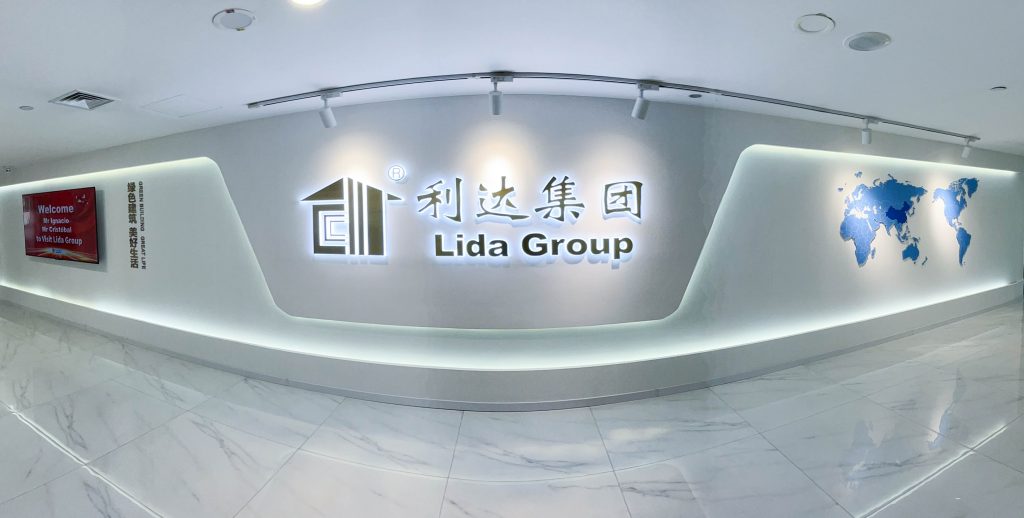
Related news
-
Why Mining and Construction Giants Choose Lida Group's Temporary Sandwich Panel Houses for Remote Site Accommodation.
2025-09-04 15:50:24
-
Prefab Worker's Dormitory Solutions by Lida Group Combine the Durability of Sandwich Panels with Mobile Convenience
2025-09-04 15:29:15
-
Lida Group Sets a New Benchmark for Rapid Deployment with Its High-Quality Mobile Building Worker Dormitories
2025-09-02 17:37:17
contact us
- Tel: +86-532-88966982
- Whatsapp: +86-13793209022
- E-mail: sales@lidajituan.com


